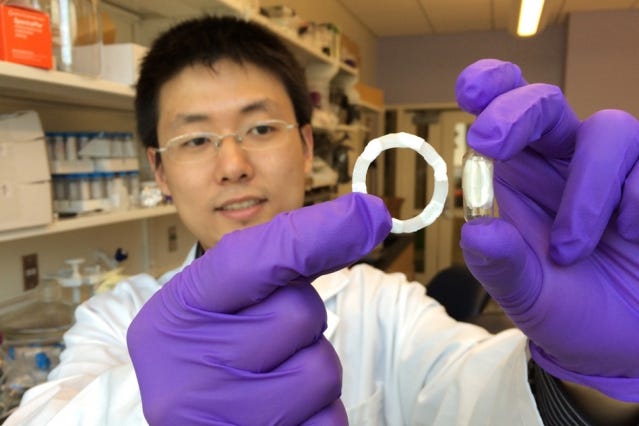July 28, 2015
Researchers developed a pH-responsive polymer gel that could enable the development of new swallowable devices and capsules with ultra-long drug delivery capabilities.
Kristopher Sturgis
|
Shiyi Zhang, postdoc at Koch Institute, holding a ring-shaped prototype, which can be folded into a swallowable capsule (shown on the right) for safe oral delivery. |
A new pH-responsive polymer gel could enable long-acting devices to reside in the stomach for days, weeks, or even months on end following administration. This is a considerable feat given the body's determination to digest and pass along whatever enters the stomach.
The polymer, developed by researchers from MIT's Koch Institute for Integrative Cancer Research from MIT, can withstand prolonged periods of time in the stomach while releasing drugs over a period of time. The polymer gel is stable in the acidic environment of the stomach but dissolves in the near neutral pH environment of the small intestine, allowing it to pass safely through the gastrointestinal tract.
"There's a tremendous need for devices with the capacity to safely reside in the stomach," said Giovanni Traverso, Koch Institute research affiliate and one of the senior authors of a recently published study describing the work. "The ability to safely reside in the stomach enables the development of ultra-long dosage systems, which helps tackle the medication nonadherence problem. Many diseases suffer from non-adherence, from the treatment of malaria, to schizophrenia, and even cancer," Traverso adds.
According to the CDC, nearly 50% of medications prescribed by doctors are not taken as prescribed, and nonadherence is responsible from between 30-50% of treatment failures, resulting in roughly 125,000 deaths each year.
This goes to show why Traverso and his colleagues believe that single-administration delivery systems can have such a big effect on so many different treatments.
Drug-delivery systems like this one are the subject of considerable research. Traverso's research, however, is unique in that it is investigating a delivery mechanism in the stomach over the long term. Traditionally, the stomach has been traditionally viewed as a short-term delivery pathway. In addition, much of the research on recent drug delivery research has been related pathways other than the stomach--direct injection into the brain and targeted nanoparticle delivery to cite two examples.
According to Traverso and his colleagues, the stomach is an area rife with opportunity for prolonged drug delivery systems, which is why this polymer gel could become such a crucial development.
The novelty of the gel lies in its ability to dissolve into the intestines, something existing polymers have been unable to do, making it difficult for them to pass through the body. To solve this problem, these researchers synthesized an elastic polymer and combined it in solution with a clinically used enteric polymer. The result was a polymer gel that contains both elastic and enteric properties, the elasticity allows it to be molded into a dosage form, while the enteric properties allow it to remain stable in the acidic environment of the stomach before dissolving in the small intestines.
"We see this technology inspiring the development of various devices," Traverso said. "Including those for drug delivery, as well as monitoring of various physiological and pathological parameters."
For now this team hopes that the material could be a big step toward single-administration drug delivery systems, and could eventually be used to create extended-release systems through swallowable pills.
Refresh your medical device industry knowledge at MEDevice San Diego, September 1-2, 2015. |
Like what you're reading? Subscribe to our daily e-newsletter.
About the Author(s)
You May Also Like



